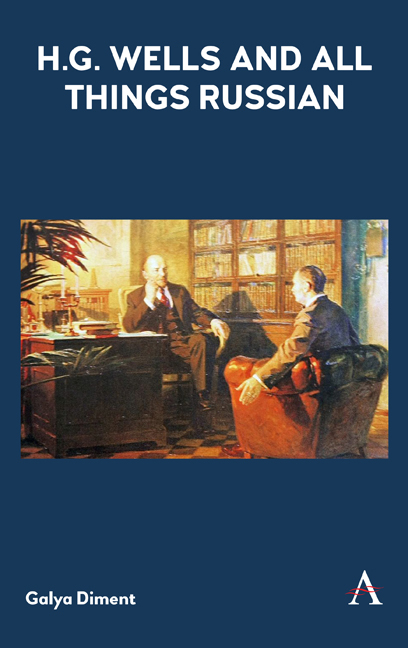Book contents
- Frontmatter
- Dedication
- Contents
- List of Illustrations
- Acknowledgments
- List of Contributors
- A Note on Transliteration
- Introduction: “The Wells Effect”
- Part One WELLS IN RUSSIA: PRE-WORLD WAR II
- Chapter One Yevgeny Zamyatin and the Wellsian Utopia
- Chapter Two Time Machines and Metamorphoses: H. G. Wells's Influence on Mikhail Bulgakov and Sigizmund Krzhizhanovsky
- Chapter Three “The Wellsian Twist” in Nabokov's “Terra Incognita”
- Part Two WELLS IN RUSSIA: POST-WORLD WAR II
- Part Three RUSSIA IN WELLS
- APPENDIX TRANSLATIONS
- Bibliography
- Wells, Herbert George – Works Index
- General Index
Chapter Three - “The Wellsian Twist” in Nabokov's “Terra Incognita”
from Part One - WELLS IN RUSSIA: PRE-WORLD WAR II
Published online by Cambridge University Press: 06 September 2019
- Frontmatter
- Dedication
- Contents
- List of Illustrations
- Acknowledgments
- List of Contributors
- A Note on Transliteration
- Introduction: “The Wells Effect”
- Part One WELLS IN RUSSIA: PRE-WORLD WAR II
- Chapter One Yevgeny Zamyatin and the Wellsian Utopia
- Chapter Two Time Machines and Metamorphoses: H. G. Wells's Influence on Mikhail Bulgakov and Sigizmund Krzhizhanovsky
- Chapter Three “The Wellsian Twist” in Nabokov's “Terra Incognita”
- Part Two WELLS IN RUSSIA: POST-WORLD WAR II
- Part Three RUSSIA IN WELLS
- APPENDIX TRANSLATIONS
- Bibliography
- Wells, Herbert George – Works Index
- General Index
Summary
As for the men of my time who have been able to capture a large audience […] they are all, by comparison with Mr. Wells, pygmies.
— T. S. Eliot, “Wells as Journalist”Forty-four years ago, during my first college class in which we could write short stories instead of essays, Professor Roy Arthur Swanson warned us not to attempt stories with trick or ambiguous endings. My notebook says “For now, leave the ‘Lady or the Tiger’ tales to H.G. Wells and Nabokov.” A visit to Professor Swanson's office soon revealed that he was busy finishing his article on Nabokov's Ada as science fiction, a move he feared would risk Nabokov's contempt, but he did take the time to clarify that, in addition to Stockton's, the stories he had in mind were Nabokov's “Terra Incognita” (1931) and H. G. Wells's “The Remarkable Case of Davidson's Eyes” (1895). The stories share not only the ambiguous endings but also the frame (main character's simultaneous access to two worlds, both real but very distant from each other). There is also much echoing among the motifs Wells and Nabokov deploy in their efforts to depict the effects of simultaneity generated by their respective stories’ positing of main characters who somehow exist in and across coexisting (separate but equi-present) fictional worlds.
Influence?
Since “The Remarkable Case of Davidson's Eyes” was published four years before Nabokov was born, one could very well try to make the case for influence, not the sort of Wellsian influence one finds in Huxley, Orwell, Zamyatin, Golding and Vonnegut, but influence nonetheless. And by influence I do not mean the idea that Nabokov's story is to be understood as somehow entirely contained within the antecedent conditions of Wells's. Nabokov was known to have “operated a landfill for literary reputations into which he tipped any number of the late nineteenth centuries’ prominent authors and their acclaimed works.” So it would be problematic to make for Nabokov the kind of watered-down claim Julia Kristeva makes for Bakhtin, arguing that he experiences “writing as a reading of the anterior literary corpus and the text as an absorption of and a reply to another text.”
- Type
- Chapter
- Information
- H. G. Wells and All Things Russian , pp. 51 - 78Publisher: Anthem PressPrint publication year: 2019



